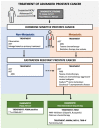Management of Advanced Prostate Cancer in the Precision Oncology Era
- PMID: 37174018
- PMCID: PMC10177563
- DOI: 10.3390/cancers15092552
Management of Advanced Prostate Cancer in the Precision Oncology Era
Abstract
Prostate cancer (PC) is the second leading cause of cancer death in men in the United States. While diversified and improved treatment options for aggressive PC have improved patient outcomes, metastatic castration-resistant prostate cancer (mCRPC) remains incurable and an area of investigative therapeutic interest. This review will cover the seminal clinical data supporting the indication of new precision oncology-based therapeutics and explore their limitations, present utility, and potential in the treatment of PC. Systemic therapies for high-risk and advanced PC have experienced significant development over the past ten years. Biomarker-driven therapies have brought the field closer to the goal of being able to implement precision oncology therapy for every patient. The tumor agnostic approval of pembrolizumab (a PD-1 inhibitor) marked an important advancement in this direction. There are also several PARP inhibitors indicated for patients with DNA damage repair deficiencies. Additionally, theranostic agents for both imaging and treatment have further revolutionized the treatment landscape for PC and represent another advancement in precision medicine. Radiolabeled prostate-specific membrane antigen (PSMA) PET/CT is rapidly becoming a standard of care for diagnosis, and PSMA-targeted radioligand therapies have gained recent FDA approval for metastatic prostate cancer. These advances in precision-based oncology are detailed in this review.
Keywords: PARP inhibitors; PSMA; advanced prostate cancer; biomarkers; chemotherapy; genomic selection; immunotherapy; metastatic prostate cancer; radioligand therapy; theranostics.
Conflict of interest statement
The authors declare no conflict of interest.
Figures

References
-
- Cancer of the Prostate—Cancer Stat Facts. [(accessed on 16 November 2022)]; Available online: https://seer.cancer.gov/statfacts/html/prost.html.
-
- Denmeade S.R., Isaacs J.T. Holland-Frei Cancer Medicine. PMPH; Beijing, China: 2003. Overview of Regulation of Systemic Androgen Levels.
-
- Catalona W.J., Partin A.W., Sanda M.G., Wei J.T., Klee G.G., Bangma C.H., Slawin K.M., Marks L.S., Loeb S., Broyles D.L., et al. A Multi-Center Study of [−2]Pro-Prostate-Specific Antigen (PSA) in Combination with PSA and Free PSA for Prostate Cancer Detection in the 2.0 to 10.0 Ng/ML PSA Range. J. Urol. 2011;185:1650–1655. doi: 10.1016/j.juro.2010.12.032. - DOI - PMC - PubMed
Publication types
Grants and funding
LinkOut - more resources
Full Text Sources
Miscellaneous

